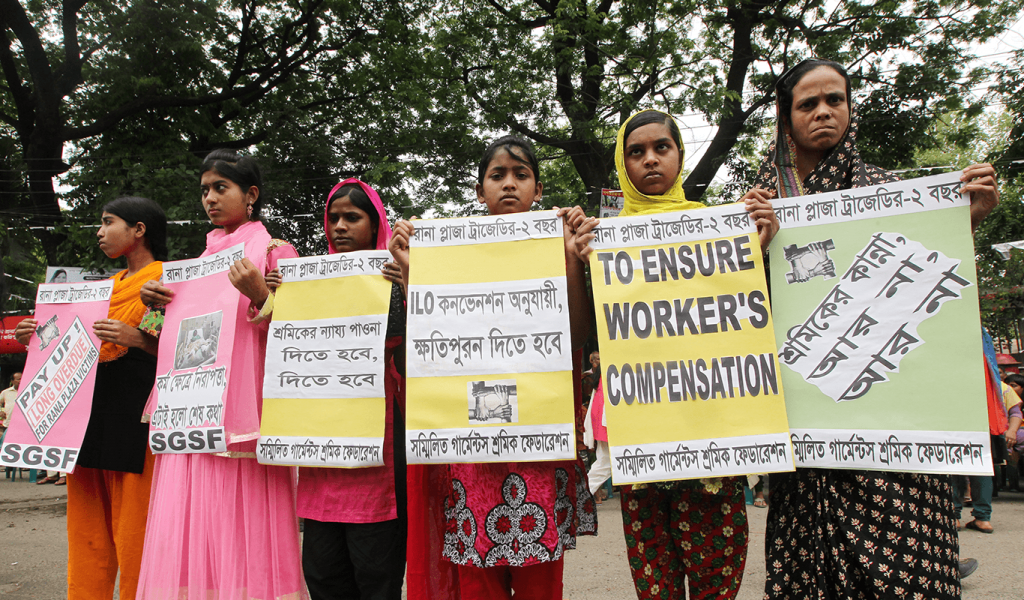Eight years on from the Rana Plaza tragedy
Eight years ago, on April 24, 2013 in Dhaka, Bangladesh a tragedy made the world take notice of the plight of garment workers stuck in overcrowded factories working for poverty wages. The Rana Plaza collapse claimed the lives of more than a thousand garment workers and injured over 2,500 more. This tragic incident put a spotlight on the garment industry and its global supply chains. Following the collapse, promises were made by brands to do better when it comes to workers’ safety resulting in the Accord on Fire Building Safety in Bangladesh and Alliance for Bangladesh Workers Safety. Now, almost a decade later and amid a global pandemic, one has to ask – have those brands kept their promises of doing better to the women who make our clothes? Sadly, other than improvements in factory safety conditions, the lives of these women have not changed much.
The vulnerabilities of the women who make our clothes are more prominent than ever. A year ago, we highlighted the economic impact of COVID-19 and the implications of companies skirting their responsibility to “protect and fairly compensate the women that make what we wear.” The result acted as a twin train wreck for garment workers. Orders were abruptly cancelled, which left millions of workers unemployed without severance pay. Up to this day, workers, even when working overtime, still do not make a living wage, and are struggling to have one decent meal a day. Without overtime pay, workers are finding themselves falling further and further into debt – all of which increases the risk of modern slavery. The fight for a living wage and better working conditions has never been as critical as it is now.
Oxfam Canada, unions and civil society organizations are standing in solidarity with garment workers in Bangladesh and around the world today on the 8th anniversary of the Rana Plaza tragedy calling for immediate action to improve the lives of the women who make our clothes by paying a living wage and increasing supply chain transparency.
A living wage is needed now and would allow the women who make our clothes the opportunity to provide basic necessities like food, water, shelter, healthcare, childcare, clothing, education, and transportation for themselves and their families, as well as saving some money in case of an emergency, like the pandemic.
WHAT NEEDS TO HAPPEN NOW
To improve the lives of the garment workers and the women who make our clothes, Oxfam Canada along with its partners and allies calls upon brands to take four critical actions.
Pay Worker Wages:
Brands and retailers should honor their suppliers and workers by ensuring payment of orders completed or in production. They should ensure that the workers who are employed as well as those who lost their jobs due to the pandemic are paid their due wages and benefits as outlined in the #PayYourWorkers campaign.
Ensure Workers’ Health and Safety:
Canadian brands and companies must ensure that supplier factories in Bangladesh are following World Health Organization’s procedures in order to protect their workers. They must ensure that the workers are provided with proper protective gear and guidelines to reduce the spread of the virus. Moreover, the Accord on Fire and Building Safety is coming to an end in May 2020 which is supposed to be replaced by a non-legally binding RMG Sustainability Council (RSC). Oxfam in solidarity with its allies calls upon the brands to sign on to a new legally binding Accord to #Protect Progress made towards factory health and safety standards.
Be Transparent:
Canadian brands must ensure full transparency in supply chains and identify human rights risks and impacts to address them. The lack of transparency increases the vulnerabilities of workers, especially due to the pandemic. Supply chain transparency is critical to ensure that workers are not exploited, and their human rights are intact.
Commit to Paying a Living Wage:
Canadian brands and retailors should ensure that the wages of the workers are increased to match living wages. They should commit to paying a living wage to workers to ensure a decent life. Oxfam Canada will be launching its What She Makes Campaign later this year calling on Canadian brands to pay living wages to the women who make our clothes.
In remembrance of the workers who lost their lives during the Rana Plaza collapse and the women who are making our clothes despite the pandemic, we ask all Canadian brands to collaborate and do better!

